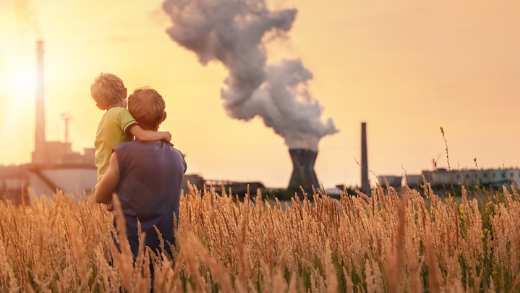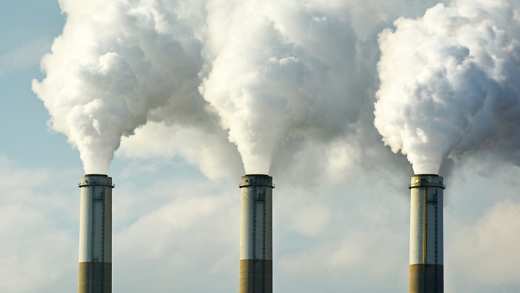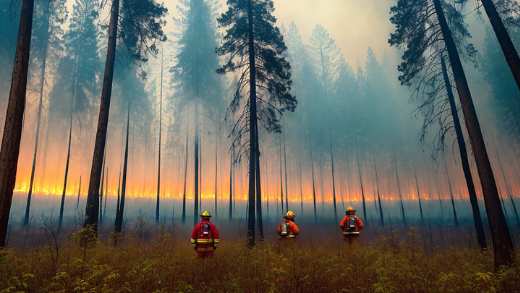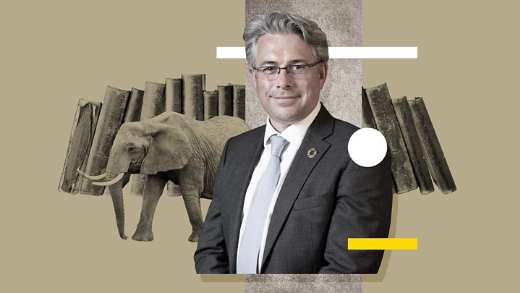Investing in the climate transition
The scale and urgency of change needed to ensure global greenhouse gas emissions are aligned with a 1.5 degrees Celsius pathway will impact every part of the global economy. Our Climate Transition Global Equity Fund invests in companies and assets driving fundamental changes toward a sustainable future. We invest with an active, high-conviction approach to address the needs of investors seeking two objectives:
Long-term capital growth
To support the transition to a low-carbon world
Investment opportunities in the strategy are linked to the following investment themes and aligned with the principles of the following United Nations Sustainable Development Goals:
Affordable and clean energy
Climate action
Our approach
We seek to identify the winners from the transition across a broad range of sectors. First, we exclude more carbon-intensive fossil-fuel companies. We then invest in companies either mitigating or adapting to climate change, or are transition-oriented companies, while leveraging our scale and influence to engage with portfolio companies. This approach can lead to the following investor benefits: profitable growth, resilience across market cycles and influencing positive outcomes.
Three-dimensional view
We look for companies with a competitive advantage that can turn a sustainable focus into profitable growth, whilst achieving positive climate outcomes.
Back transition
The journey to net zero presents risks and opportunities across all sectors. Most climate strategies are structurally biased towards growth stocks but our focus on transition as well as climate solutions allows for a more balanced exposure.
Stewardship and engagement
All portfolio holdings are targeted with two timebound engagement asks: Science-based targets and CDP disclosures. We also actively engage with governments, policymakers, NGOs, academics and other key influencers to correct material market failures.
Climate Transition Equity investment strategies
Aviva Investors Climate Transition Global Equity Fund
This strategy aims to deliver long-term capital growth by investing in companies globally that either provide solutions to climate change or orientate their business models to a low-carbon economy, while avoiding the most carbon intense fossil fuel-based companies.
Evidencing how we are progressing against our sustainable outcomes objective
This report looks at the progress the fund has made in 2022, in delivering tangible sustainable outcomes for clients, across the companies invested in as well as through company engagement and macro stewardship.

No sector left behind: Introducing the Aviva Investors Climate Transition Global Equity Strategy
The Aviva Investors Climate Transition Global Equity strategy aims to drive progress towards a more sustainable future and deliver enhanced returns for investors.


Aviva Investors Climate Transition Global Equity: Strategy in brief
The strategy has limited exposure to carbon-intense fossil fuels and invests in a broad range of companies across sectors that are best positioned to benefit from the transition to a low-carbon world.
-

On target: Why SBTs trump net zero at changing behaviour
Investors must push companies to play their part in tackling the climate crisis by adopting science-based targets, argues Rick Stathers.
-

Climate adaptation and resilience: Preparing for a warmer, wilder world
Millions of hours have been spent negotiating net-zero targets, but many human-led climate impacts are already locked in. Our credit and equities portfolio managers explain where they see opportunities in solutions providers that will help society adapt for the new reality.
-

Investing for climate action: Easy as SBTs?
With governments struggling to turn words into action on climate change, investors can ensure the private sector plays its part by pushing firms to adopt science-based targets, argues Rick Stathers.
-

Supply and demand: Tackling both sides of the carbon emissions equation
Despite progress through our Climate Engagement Escalation Programme, more action is needed from the world’s 30 systemically important carbon emitters, as Sora Utzinger and Louise Wihlborn explain.
Key risks
For further information on the risks and risk profiles of our funds, please refer to the relevant KIID and Prospectus.
Investment risk & currency risk
The value of an investment and any income from it can go down as well as up and can fluctuate in response to changes in currency and exchange rates. Investors may not get back the original amount invested.
Derivatives risk
Investments can be made in derivatives, which can be complex and highly volatile. Derivatives may not perform as expected, meaning significant losses may be incurred.
Illiquid securities risk
Some investments could be hard to value or to sell at a desired time, or at a price considered to be fair (especially in large quantities), and as a result their prices can be volatile.
Sustainability risk
The level of sustainability risk to which the Fund is exposed, and therefore the value of its investments, may fluctuate depending on the investment opportunities identified by the Investment Manager.
Strategies in focus
Sustainable transition
A range of strategies investing in opportunities to accelerate change for Climate, People and Earth.

Climate Transition Equities team

Max Burns
Global Equities Portfolio Manager & Head of Equity Research

Andrea Carzana
Senior Portfolio Manager and Head of Sustainable Equities
Need more information?
For further information, please contact our investment sales team.
Climate change views
-

The time to lead: Reforming multilateral development banks through a climate lens
28 Nov 2023
To have a chance of limiting global warming to less than two degrees, the world must unlock huge investments in emerging markets. This is prompting calls for the reform of multilateral development banks, but will this be enough?
-

Deals delayed and crowded trades…But investors can still find value in infrastructure debt
4 Sep 2023
Private infrastructure debt still offers a broad spectrum of opportunities, but investors face complex challenges. In this Q&A, our infrastructure debt team contemplate the current state of the market and where it goes from here.
-

Mad about the boy: Understanding the economic and investment impacts of El Niño
25 Aug 2023
How much do ocean circulation patterns impact economic outcomes and sovereign risk? Rick Stathers and Carmen Altenkirch assess El Niño, the climate phenomenon driving atmospheric circulation in the tropics, affecting everything from GDP to inflation and social stability.
-

Tipping points and transformation: Getting on the right side of change
16 Aug 2023
Rapid changes in the global economy could tip some sectors into low-carbon phases faster than incumbents expect, with important investment implications.
-

The heat is on: Opportunities and risks for climate-focused bond investors
8 Aug 2023
Thomas Chinery and Justine Vroman discuss current conditions in the investment-grade market, the ECB’s “green QT” programme, and why oil and gas firms must go further and faster to decarbonise.
-

Over(shooting) the limit: Why we need to keep within planetary boundaries
26 Jul 2023
Demand for fuel and raw materials is decimating the natural world, making extreme climate effects more likely. So, what might the world be like for people and investors as we go beyond planetary boundaries?
-

Methane: Heating up
25 Jul 2023
Methane is the second most important gas contributor to climate change after carbon dioxide, but its warming potential is many times greater. Mikhaila Crosby explains why addressing emissions is a key priority.
-

Supply and demand: Tackling both sides of the carbon emissions equation
5 Apr 2023
Despite progress through our Climate Engagement Escalation Programme, more action is needed from the world’s 30 systemically important carbon emitters, as Sora Utzinger and Louise Wihlborn explain.
-

Act now: A climate emergency roadmap for the international financial architecture
1 Nov 2022
To help tackle the climate emergency, financial institutions and governments must work together to reform the global financial architecture and create a more robust net-zero transition plan, argue Steve Waygood and Thomas Tayler.
-

The levers of change: A systems approach to reconcile finance with planetary boundaries
13 Sep 2022
Financial services underpin all economic activity, which itself depends on Earth’s natural capital. Resolving their interconnected issues to bring about a just transition will require a holistic, systems-thinking approach.
-

A tragedy of perception: Fixing the ESG blind spots in business, finance and economics
8 Sep 2022
A distorted sense of reality has caused us to disregard sustainability concerns when modelling economies, companies and finance. We can no longer ignore such material issues just because they are too hard to fathom. This is where systems thinking comes in, explains Steve Waygood.
-

Redefining stewardship: Why stakeholder capitalism needs to wake up
31 Aug 2022
Asset managers and other financial institutions have a duty to act in the best interests of their customers and society. Macro stewardship will be crucial to meeting these responsibilities, argues Mark Versey.
-

Know your limits: An interview with Nafeez Ahmed
29 Aug 2022
Warnings that natural systems are close to breaking point are not new – but how will we respond? Combining what we know with existing technologies could offer a remarkable opportunity to rethink our world, as Nafeez Ahmed explains.
-

The burning issue: Avoiding ESG fatigue
25 Aug 2022
How can we face existential problems and stay positive? Abigail Herron contemplates simple steps to protect momentum and avoid burnout.
-

Strategies to change the financial system: An interview with Natalie Mangondo
16 Aug 2022
Can society reform the system that has enabled growth but simultaneously brought the long-term health of the planet into question? UN Climate Change High Level Champions Finance Youth Fellow Natalie Mangondo contemplates choices and change with AIQ.
-

Investing in a just transition to net zero: A Q&A with Nick Robins
30 Jun 2022
Reaching net zero by 2050 will require significant injections of capital. But it is also an opportunity to rethink social relationships, as Professor Nick Robins explains.
























